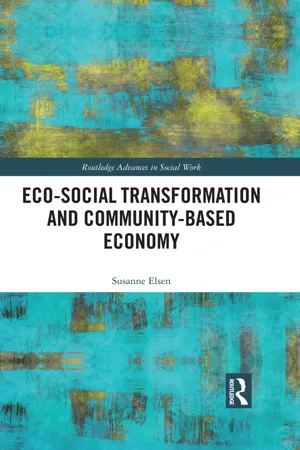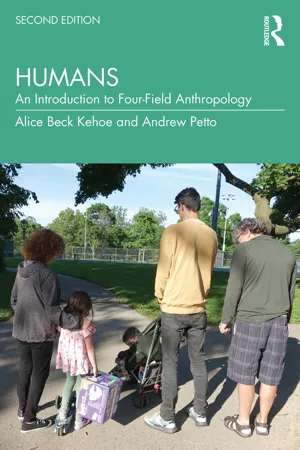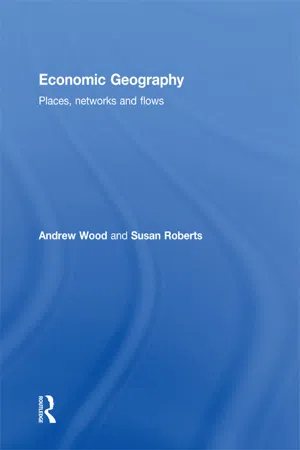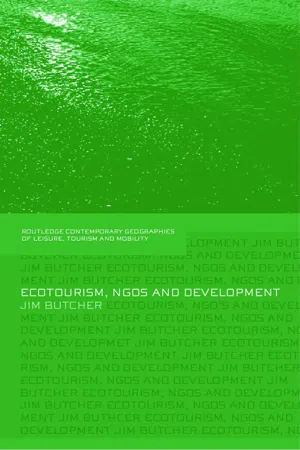Economics
Traditional Economies
Traditional economies are based on customs, traditions, and bartering systems, with little reliance on technology or modern methods of production. These economies often revolve around subsistence farming, hunting, and gathering, and are typically found in rural and remote areas. Decision-making is guided by cultural and social norms, and economic activities are passed down through generations.
Written by Perlego with AI-assistance
Related key terms
Related key terms
1 of 4
Related key terms
1 of 3
4 Key excerpts on "Traditional Economies"
- Susanne Elsen(Author)
- 2018(Publication Date)
- Routledge(Publisher)
community implies the need to recognize the interdependency of subjects and economic practices and of going beyond an individualistic perspective without refusing singularity and individuality. The idea and its existing forms of community-based economies are alternative concepts to the dominant rationalities of economy and society, to the burden of financial interests, to the focus on self-interest, and to the fixation on competition and growth. In their existing real-life forms, approaches that pursue the idea of a community economy are based on fundamental human, social, and ecological needs, respecting the limits of natural resources through sustainable use. It is a kind of counterculture, counter-economy, and counter-democracy, which challenges the conventional societal and economic system, is rooted in democratically run organizations, and creates a totally novel understanding of the social bond and connectedness in society (Wallimann 2014).Despite the diverse range of community-based economies, we can now identify core criteria, some of which already set out by the international cooperative movement more than 150 years ago:- Visioning economy as multifaceted social activities, being aware that diversity creates resilience
- Acknowledging humans as individuals in their social embedding, acting in different situations corresponding to different rationalities, and using different means of coordination
- Respecting the systemic fact that economy is part of societies that are part of a finite global eco-system
- Acknowledging nature not as a usable resource but with its distinct entitlements independent from its utility for humans
- Using local resources and protecting natural and social livelihood, serving basic needs, and distributing benefits in an equitable way
- Being aware of different concepts of ownership, access rules, and fair common-pool resource management
- Extending the interpretation of labor to include all forms of meaningful work
Emanating from the certainty that economy is a broad field and comprises more entities than enterprises, more sectors than markets, more actors than employers and employed, more work than just paid employment, and more rationalities than making money, the concept of community economy opens up the perspective to the plurality of social productivity (Elsen 1998: 154–183). We talk about a monetized economy as well as about subsistence economy, informal and formal earning, common use, cooperating, sharing, exchanging, and more.- eBook - ePub
Humans
An Introduction to Four-Field Anthropology
- Alice Beck Kehoe, Andrew J Petto(Authors)
- 2022(Publication Date)
- Routledge(Publisher)
Chapter 11 EconomicsDOI: 10.4324/9781003226819-12Getting a living is economics (Figure 11.1 ). “Production of raw materials” and “manufacture and distribution” are economic activities. A community’s economy involves the resources available to its members, their technology, and their social organizations for utilizing resources. Economics is embedded in ecology, which is why the sentences above sound much like our preceding chapter. Focusing on economics, the production of raw materials including food, and manufacture and distribution of the material culture of a society, lifts human activities out of the ecological matrix for a finer-tuned examination of the social relations of getting a living.Figure 11.1 Economic aspects of cultural ecology.Comparing Anthropological Economics to Formal Economics
College courses in economics tend to limit their field to formal economics, models of modern Western economic systems recognized in government planning. The discipline of formal economics was created in the late eighteenth and nineteenth centuries by European philosophers and politicians setting out a rational explanation for the social changes we call the Industrial Revolution. Early modem (seventeenth century) European states replaced the medieval feudal structure of personal loyalties and little choice of occupation with the impersonal structure of centralized political power enforced through codes of law. Citizens were no longer expected to seek aristocratic patrons and serve, if ordered, in their private armies battling for the throne, so vividly dramatized in Shakespeare’s historical plays. Earning a living moved into a national framework, with people free (as medieval serfs had not been) to change jobs and move to where there was a market demand for their goods or skills.Personal mobility prompted people to think of the national state as their arena, and their protector against tyrannical local lords. In the first phase of modern state-building, English philosopher Thomas Hobbes argued that humans “naturally” fight like dogs for a bit of meat; and that such a “war of all against all” can be controlled by enlightened people realizing that to escape “nasty, brutish and short” lives, they must contract (formally agree) to establish offices of authority entitled to enforce laws for the common good. A century after Hobbes, Adam Smith thought he discerned “the invisible hand” of the market manipulating social relations. The form of the modern European state with its central authority enforcing written laws over all persons in its territories was no longer controversial. It now seemed “natural” that people should choose their occupation and residence and base their choices on opportunities to obtain maximum price or profit from whatever deal they could get from their money, property, or labor. - eBook - ePub
Economic Geography
Places, Networks and Flows
- Andrew Wood, Susan Roberts(Authors)
- 2012(Publication Date)
- Routledge(Publisher)
PART I
TRADITIONAL ECONOMIC GEOGRAPHIES
Economic geography is a broad and diverse field. Today, a significant number of economic geographers, regional scientists, planners and economists continue to work with and refine concepts drawn from what we are labeling ‘traditional economic geography.’ Traditional economic geography not only has deep roots but continues to develop and evolve. However, it should be pointed out that many economic geographers (and other social scientists too) deliberately ignore traditional economic geography on the grounds that they are not motivated by the same sorts of questions traditional economic geography asks, they do not use the same sorts of methods it favors, and they have different understandings of the broader social and political roles of economic geography.So, what are the hallmarks of traditional economic geography? First, there is an abiding commitment to rationalism. By this we mean that traditional economic geography is based on assumptions that the world can be known through observation and that it is fundamentally an ordered word. That is, that there are regularities and patterns that need to be identified and explained by the economic geographer. Further, the world's orderliness, including its spatial patterning, is itself the outcome of orderly economic processes, treated in many accounts as laws of economic activity. Orderly economic patterns and processes, in traditional economic geography, are seen as the outcome of rational decisions made by economic actors; typically individuals and firms. These rationalist underpinnings have come in for considerable skepticism and criticism, as Trevor Barnes has detailed in his writings on the history of ideas in economic geography (1996, 2000). However, the powerful discipline of economics is very much based on these foundations, as is much so-called common-sense understanding of the market or the economy, so it is not surprising that the approaches of traditional economic geography continue to attract many and, as Paul Plummer indicates, they most definitely have not been ‘consigned to the dustbin of intellectual history’ (Plummer 2000: 28). Indeed, it could be argued that through the attention given to geographical questions by such prominent economists as Paul Krugman, traditional economic geography approaches have been reinvigorated in the past decade or so. Certainly, a major methodological goal of traditional economic geography and of economics, ‘being able to produce tightly specified models’ (Krugman 2000: 59), continues to exercise many. - eBook - ePub
Ecotourism, NGOs and Development
A Critical Analysis
- Jim Butcher(Author)
- 2007(Publication Date)
- Routledge(Publisher)
This emphasis on tradition is mirrored in the discussion of the development merits of ecotourism. There is a strong emphasis on tradition in the conceptualisations of culture and cultural change in its advocacy. Specifically, the preservation of traditional knowledge is deemed central to sustainable tourism development.This chapter reviews the pertinent documentary literature for each case study in turn. Following a critical review of each case study, common and divergent themes are identified, and the chapter offers an analysis of the significance of the emphasis on traditional culture based on this.A number of important themes arising from the discourse are considered: the notions of culture entrenched in the past; cultural relativism; culture as functional; and also the apparent contradiction in the support for local traditions through external intervention.Specifically, it is argued that the functional and relativistic approach to culture implicitly and explicitly adopted in the advocacy of ecotourism as sustainable development leads to a restricted and restrictive conceptualisation of development.The chapter also comments on the claim that traditions in rural communities embody a way of thinking that is benign towards the environment, sometimes referred to as ‘the environmentalism of the poor’ – a notion strongly implied in the advocacy of ecotourism. Finally, it is suggested that far from the emphasis on tradition reflecting the culture of the community, it would be more accurate to say that it is made in the West.A note on terminology – tradition, traditional societies and traditional knowledge
Traditional societies are those that function on the basis of subsistence agriculture and are not substantially integrated into the world economy through trade and the international division of labour. They are societies or communities that have not been party to the process of modernisation associated with the developed world. They are hence sometimes referred to as marginal, and are inevitably economically poor. In such societies, traditions are rooted in a direct relationship to the natural environment, relatively unmediated through modern technology and the global division of labour.
Index pages curate the most relevant extracts from our library of academic textbooks. They’ve been created using an in-house natural language model (NLM), each adding context and meaning to key research topics.
Explore more topic indexes
Explore more topic indexes
1 of 6
Explore more topic indexes
1 of 4



